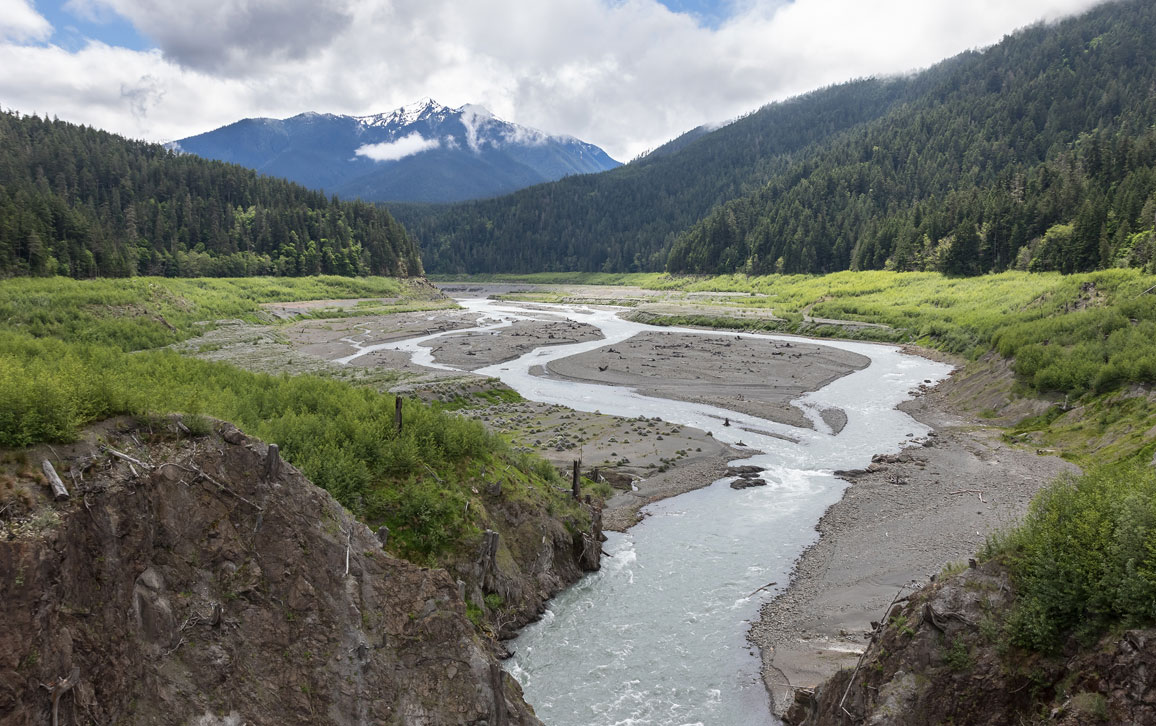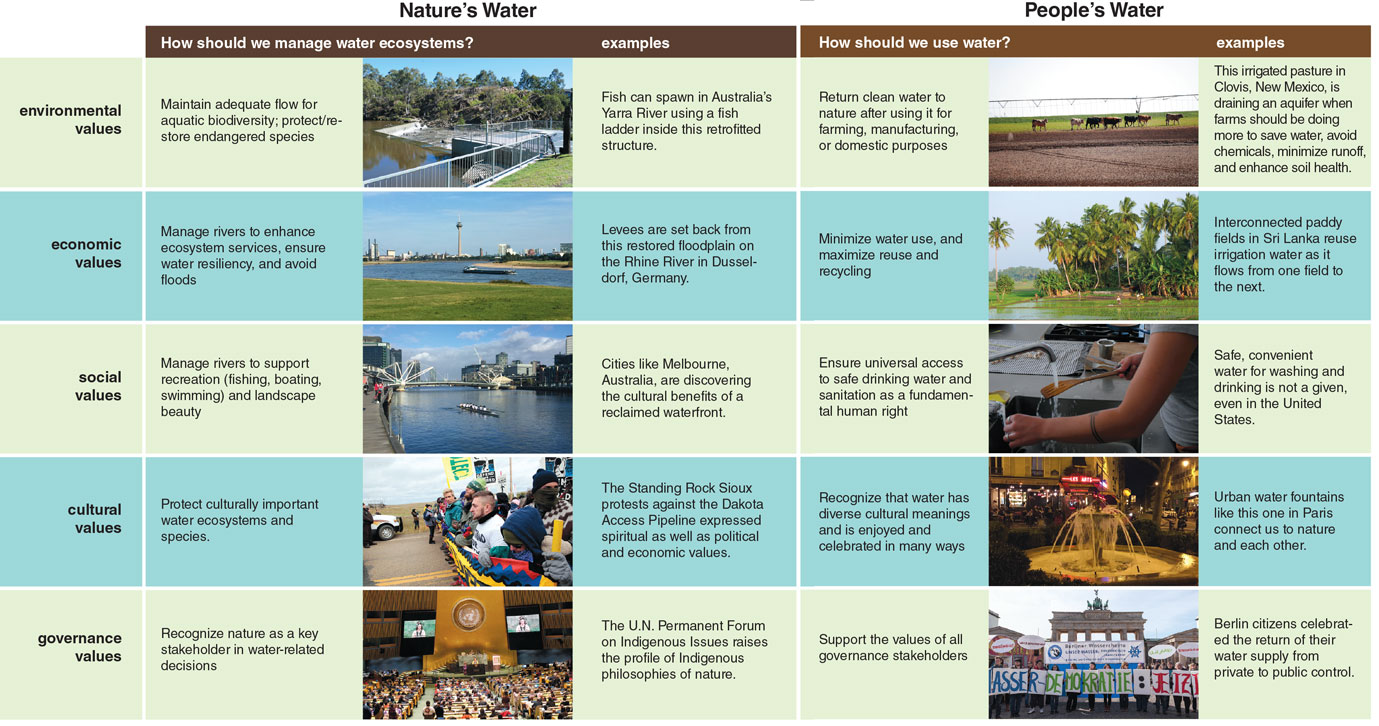Why We Need Water Ethics
By David Groenfeldt
A values-based framework can guide water policy decisions that are both practical and moral.
A values-based framework can guide water policy decisions that are both practical and moral.

In his 1949 essay, “The Land Ethic,” conservationist Aldo Leopold invokes the story of the hero Odysseus coming home after a 20-year absence fighting the Trojans and enduring a long, adventurous return voyage. Putting his palace back in order, Odysseus hangs a dozen girl slaves “whom he suspected of misbehavior during his absence.” In the cultural context of that time, slaves were considered property whose lives could be terminated by the owner without any moral implications. Ghastly, yes, but it drives home Leopold’s point that concepts of what is ethical can and do change over time.
On a more positive note, Leopold saw that such ethical malleability means that we have the capacity to adopt different values. He regarded the emergence of an ethical relationship with nature as “an evolutionary possibility and an ecological necessity,” and he argued that, in theory, we have the capacity to establish a sustainable relationship with the natural world. But it is not a foregone conclusion that we will succeed in doing so.

Stephan Häusler
What can we do to tilt the outcome toward sustainability? One promising path would be to develop a robust ethical discourse about our responsibilities to both nature and people, and particularly to future generations. Such a scenario is beginning to emerge in the field of water policy both locally and globally. By focusing on ethics— the art and science of deciding what action to take in light of our values—we can take a more systematic approach to managing water in ways that maximize benefits for all stakeholders, including disadvantaged groups, indigenous communities, and, as Leopold reminds us, nature. An ethics-oriented approach to water decisions helps clarify what’s really at stake in proposed projects such as a hydroelectric dam, or a fracking lease.
Over the past 5,000 years, we have learned a lot about how to manage water. Yet even within such a thoroughly vetted field of study, there are still major disputes. Many groups disagree on the value of hydroelectric dams, how much water pollution is acceptable, or whether endangered fish warrant expensive protections, for instance. Although the word ethics rarely appears in water reports, it is generally accepted that water has different kinds of values, from emotional and spiritual to economic, and that water policies should reflect societal norms.
Water experts took a significant step toward incorporating such norms into global water policies when they formulated the Dublin Statement on Water and Sustainable Development in preparation for the 1992 United Nations Conference on Sustainable Development in Rio de Janeiro. Among the four principles outlined in the statement was a recommendation that participatory water decision-making be done “at the lowest appropriate level.” The Dublin principles also include a commitment to “empower women to participate at all levels in water resources programs.” Societal norms were again observed in water policies in 2010, when the United Nations General Assembly voted to recognize access to safe water and sanitation as a fundamental human right.
An equally important water principle to emerge from the sustainability discourse has been the concept of maintaining at least a basic “environmental flow” to support the ecological health of rivers. Many states and countries have adopted policies promoting or requiring environmental flows, but enforcement is challenging and rivers continue to decline at alarming rates. For example, the two main rivers draining the southwestern United States, the Colorado and the Rio Grande, no longer reach the sea, primarily because of diversions for irrigated agriculture.
Both the Dublin Statement and the 1992 U.N. Conference on Sustainable Development gave prominence to the concept of integrated water resources management (IWRM). Growing out of water conferences in the 1970s and 1980s, the IWRM approach integrates planning and decision-making across potentially competing uses. A decision about how much water to allocate to a new irrigation scheme, for example, would consider competing water uses for industry, people, or nature. The approach was originally attractive because of its intuitive logic and its capacity for adding details about local contexts.
Creators of the IWRM framework acknowledged that the interests of some of the water users compete with one another. But they also showed that synergies and win-win solutions might be found through the integration of competing demands. Managers could save water, in other words, by finding ways of reusing or recycling the same quantum of water. They could treat urban water supplies (water for people) and reuse them for nonconsumptive industries, such as cooling power plants, before returning them to the river to support nature, and later diverting them farther downstream for irrigated agriculture or another industry, or water for another city.
The IWRM framework also let policymakers and administrators avoid passing judgment on the rationale for using water for any particular purpose. They could avoid picking favorites from the types of industries the water supported, or the crops being grown, or the labor conditions for farmworkers. Nor did they have to ask how the cost of urban water was shared between the rich and the poor, or who decided how water was allocated, or how water quality was monitored. Any values held by water users within a catchment area were considered valid, provided that those values matched an existing IWRM category. Meanwhile, the rights of nature, or the cultural traditions of indigenous communities, or other values outside the IWRM box, could be conveniently ignored.
Starting in 1998, the International Hydrological Programme of the United Nations Educational, Scientific and Cultural Organization (UNESCO) launched an initiative that explicitly applied ethics to water management policies and practices. It used the intellectual frame of IWRM but incorporated a broad range of crosscutting issues linking water with the larger society, including gender equity, public health, flood risks, stakeholder engagement, and institutional transparency. By linking ethics to issues already recognized as relevant to IWRM, policy analysts could identify opportunities for improving existing water policies.
The downside of this approach was that issues not already incorporated into the IWRM gestalt still remained outside the scope of UNESCO’s expanded ethical attention. For example, cultural diversity and corresponding water ontologies (the particular theories and beliefs that different cultures hold about water’s fundamental nature) remained outside the IWRM box. As a result, the most important potential benefit of ethical analysis—sparking the moral imagination—was largely missing as well.

Zalige bridge by NEXT architects/photograph Rutger Hollander
Perhaps it sounds unrealistic to look for imagination in water management, but in my view, this is precisely the standard to which we should hold our water managers accountable. It is imagination, motivated by ethics, that can lead to the creative solutions we need for tackling our water challenges. Thinking inside the box is what has gotten us into the corner where we find ourselves now. We have a robust global economy where water is an essential input, but that economy is based on value principles of resource extraction that are unsustainable. So many powerful vested interests (think “energy sector”) are doing so well in the short term that they have been unable or unwilling to even think about changing course. Ethics provides a tool for climbing the steep path out of the extractivist mindset that characterizes our relationship to water, and to nature as a whole. Just as rock climbers hammer in pitons to anchor their efforts, ethics offers a moral anchor from which we can chart a new course.
After the UNESCO program on water and ethics concluded in 2004, the Botín Foundation in Spain took up the mantle, sponsoring research and conferences with a particular focus on water ethics within the Mediterranean region, including Islamic and Christian perspectives. The intellectual lineage of water ethics entered a more complex and promising era with the publication in 2010 of the book Water Ethics: Foundational Readings for Students and Professionals. In the process, editors Peter Brown of McGill University and Jeremy Schmidt of the University of Western Ontario inadvertently laid the groundwork for a bona fide field of water ethics. Yet their real motive was not to establish a new field, but rather to serve as a corrective to the unquestioning smugness of IWRM practitioners.
My own contribution to the cause of water ethics was my 2013 book, Water Ethics: A Values Approach to Solving the Water Crisis, and like Brown and Schmidt, I aimed to show how an ethics approach could rescue IWRM from overly materialistic interpretations. It was not until I revised the book in 2019 that it dawned on me that what I really wanted was not a course correction of conventional water policies, but something larger and more radical: a field of water ethics that would encourage debate and discussion about the ethical dimensions of water use, water management, and the diverse policies and practices connected to water. This is the essential message of the 2019 edition, that it takes a village—or in this case, a field of study, debate, and discourse—to develop robust ethical solutions to what we refer to as the global water crisis.
Indigenous rights activists in Australia have popularized the concept of cultural flow to refer to water allocations earmarked for traditional cultural purposes, such as inundating a river floodplain at the right time to stimulate the growth of culturally important plants. In the pre-colonization era, those floodplains would have been inundated naturally, but now upstream farmers are diverting much of the flow for irrigation, leaving too little for the river. Just as ecologists promote environmental flows to rebalance stressed rivers, aboriginal leaders promote cultural flows to meet traditional spiritual responsibilities. The legitimacy of cultural flows, however, stems not from Western science (though the discipline of anthropology can play a supporting role), but from a distinctively non-Western ontological frame that recognizes inherent rights of nature (rivers, fish, plants).

Graphic by Barbara Aulicino; all photographs by David Groenfeldt except fourth down, left side, by Terray Sylvester/Reuters and bottom photo, right side, courtesy of Berliner-Wassertisch
Indigenous ontologies are rarely accorded serious thought when they run counter to Western scientific rationalism, and particularly when major investments such as dams, mines, or pipelines are at stake. The Standing Rock Sioux protests in 2016 and 2017 by the tribe’s water protectors, and supported by representatives from 280 North American tribes, were expressions of spiritual as well as political values. The sacred Missouri River was about to be desecrated by an oil pipeline, constructed in violation of international law—such as the UN Declaration on the Rights of Indigenous Peoples—and principles of religious freedom. Underlying the conflict, however, was a fundamental ontological disconnect. The idea of a river as a living spiritual entity has no cognitive niche in Western materialism. It was a replay of Columbus encountering the radically different cultures of 15th-century America. But after more than 500 years, Native Americans have gained a fairly sophisticated understanding of the European colonialists, whereas the descendants of those colonialists have made little headway in understanding their indigenous compatriots. (See graphic above for examples of values-based water management decisions in a range of contexts.)
The connection to water ethics is this: So long as policymakers view water within a Western ontological paradigm and as a commodifiable resource, no matter what 280 North American tribes might say, we will continue to experience standoffs like Standing Rock. Western investors and energy companies will hold fast to their ontology of free market capitalism, while indigenous communities will face the choice of fighting or surrendering. However, this is not an inevitable future. There are too many voices of reason to lose hope. The combined power of environmental and social justice movements—along with the progressive influence of both hard and soft science and the increasing urgency of climate change—bodes well for the development of hybrid ontologies combining science, nature, and spirituality. With ethics, we have a potential and perhaps necessary motivation for ontological communication, compromise, and peaceful coexistence.
By clarifying our values and ethical principles about water and nature, and about people and cultures, we will know better who we are, how we make sense of the world, and how our neighbors do the same. A robust field of water ethics, with room for divergent but ethically grounded views, can help us know ourselves and others more deeply, and find new and unexpected solutions to the challenges of the global water crisis.
Click "American Scientist" to access home page
American Scientist Comments and Discussion
To discuss our articles or comment on them, please share them and tag American Scientist on social media platforms. Here are links to our profiles on Twitter, Facebook, and LinkedIn.
If we re-share your post, we will moderate comments/discussion following our comments policy.